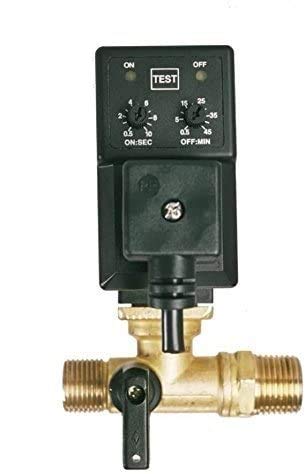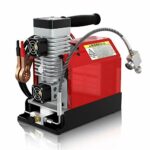
As pressure builds up and compresses air into your air compressor tank, water vapor gets compressed too and can cause water build up, and even rusting of the tanks walls. Though it is not directly advised to put anything into the compressor tank to clean it, I’ve come across a few recommendations to use Evapo-Rust if you’re having rust issues inside the tank. An uncoated inside of the tank will absorb a lot of the heat, which in turn produces a lot less moisture in the tankif you coat that tank the pump will get 4 times hotter than designed, harsh residual chemicals in it will ruin every air tool you use thereafter.
Many people spring clean their homes each year, so we think it’s about time you also try a little air compressor spring cleaning. Reciprocating air compressors need their air filter element looked over as part of every seasonal check, so that includes your air compressor spring cleaning to-do list. When looking past your air compressor spring cleaning, it’s smart to consider creating a preventative maintenance checklist that you use ensure the health of your air compressor all year long.
Let’s take a look at how to clean out your air compressor tank. You’ll be regularly cleaning your air compressor tank as part of healthy air compressor maintenance. To clean your air compressor tank, first, place your air compressor in its normal positioning.
Normal in any compressor tank, IMHO. 01-20-2015, 5:17 AM #7 We call it mayonnaise,and like posted above it’s blow by oil from compressor head mixed with moisture. The key is that if the tank does split on test under water pressure it won’t explode as it would if filled with air – the pressure is instantly released because the water does not compress…. Last edited by ian maybury; 01-20-2015 at 8:10 AM. 01-20-2015, 8:05 AM #11. Thank you for all the replies! I’m a but freaked out though. After cleaning out and testing/proving the tank make sure there’s a working pressure relief valve on it, and that the pressure/start/stop and power switches are working.
It is crucial to turn off the air compressor when cleaning the air compressor tank. There are 6 steps that you need to follow when cleaning the inside of an air compressor tank. If you are not cleaning the tank and using it like this, it will lead to dirt in the air compressor tank.
The tank does not look rusted outside and the compressor looks to be in good condition. A local repair shop told me that the rust is normal, and said I could flush it by opening the top tank brass flare nut, fill near to top with Simple Green and water, etc. I assume the former owner did not drain the tank enough and that is the reason for the rust.
how to clean air compressor tank Related Question:
How do I get rust out of my air compressor tank?
There’s one relatively safe thing you can do to remove rust. Do it with phosphoric acid. Unlike HCL (muriatic), it won’t damage the tank. If you have any chemical supply houses nearby, you may be able to buy it in a 5 pint bottle.
How often should air compressor tanks be drained?
It is recommended that you drain your tank daily, whether it is manually or automatically. Water build up in your tank can cause the bottom of your tank to rust forcing you to invest in a new tank. If you find yourself forget about draining your tank, you should look into purchasing an electronic drain valve.
Do air compressor tanks rust out?
Air-compressor tanks are especially prone to heavy rust and corrosion, especially if they’re not taken care of properly.
Is it bad to leave air in your air compressor?
The short answer is yes, it is perfectly safe to leave an air compressor full. However, this assumes that it has been properly maintained, with regular draining to remove accumulated moisture from inside the tank.
What happens if air compressor is not drained?
When air compressors run humidity in the air they compress condenses in the tank. The resulting water sits in the bottom of the tank until it is drained. When not drained regularly the tank will rust from the inside out, when the tank is weakened enough it will often fail catastrophically.
Should you bleed an air compressor?
Yes, definitely drain it after each use. Need to avoid letting water pool in the tank, possibly corroding and weakening it. Release the air and open the drain valve for a while to let out any condensation.
How long does a compressed air tank last?
Based on personal experience, an average open-water certified diver using a standard aluminum 80-cubic-foot tank on a 40-foot dive will be able to stay down for about 45 to 60 minutes before surfacing with a safe reserve of air still in the tank.
Do air compressor tanks explode?
Yes, air compressors can blow up. Air compressor explosions are most commonly caused by substantial corrosion of the compressor tank. Excessive condensation leads to corrosion, and you can avoid this outcome by monitoring and servicing the compressor and its auxiliary components.
How often do compressed air tanks need to be tested?
The Department of Transportation (DOT) requires all cylinders to be hydrostatically tested every 3, 5, or 10 years. The time allowed by law is determined by a variety of factors such as the type of material, the gas it contains, its age, and special permits the cylinder may have been manufactured under.
How do I know if my air compressor needs oil?
In the middle of the sight glass, you will see a dot. Ideally, you want the oil level to be in the center of the dot. If the oil level is below the dot, your unit needs more oil. If the oil level is above the dot, you have added too much oil.
What causes oil to in air tank?
The main causes of oil carry-over are excess oil in the reservoir, low temperatures, faulty separator filters and scavenge lines, and oil degradation. Issues can be prevented by monitoring your compressor’s temperature, checking the separator filter and scavenge line, and replacing the oil once a year.
Which oil is best for air compressor?
The Clear Choice for Lubricated Compressors In general, manufacturers today recommend using either a 20 or 30 weight synthetic lubricant — rather than a mineral oil — to get the best results out of your industrial compressed air system.

